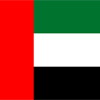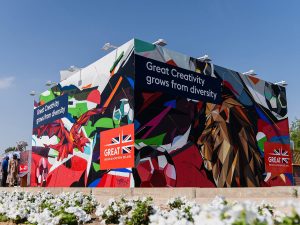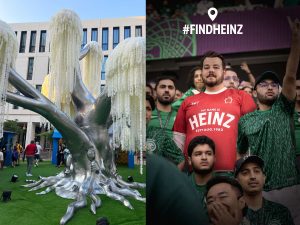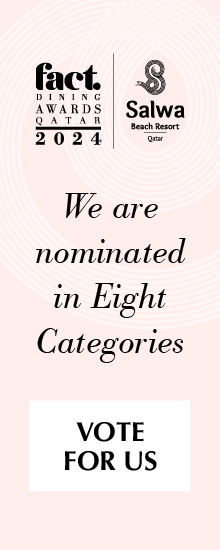QATAR’S GREEN GIFT TO THE FUTURE

Qatar has been leading the Gulf region when it comes to sustainable solutions and protecting the environment. Last year the Gulf state created the Environment and Climate Change Ministry and last month it showcased its FIFA World Cup Qatar 2022 initiatives at the UN. It’s not taking its commitment towards a greener, cleaner planet lightly. It’s national week-long campaign to raise awareness and showcase the progress Qatar has made in the areas of sustainability begins on October 8.
Qatar has launched a series of sustainability initiatives as it gets ready for the biggest event in the country’s history, the FIFA World Cup Qatar 2022. It’s the first country in the region to host the tournament and sustainability is the core of its plan to present the beautiful game to the world.
And that’s not all, it’s vowed to slash emissions by 25% as part of the National Vision 2030 and reach net zero by 2050. So how does it plan to reach these goals?

The First Carbon-Neutral World Cup
FIFA and Qatar’s Supreme Committee for Delivery & Legacy have committed to reducing and offsetting all carbon emissions related to the FIFA World Cup Qatar 2022. It promises to be the first ever climate-neutral experience in history, meaning that during the event, carbon footprint will be offset through some of the green initiatives the government has invested in. These are some of the ways Qatar plans to host the first carbon neutral world cup:
Compact Tournament
The FIFA World Cup Qatar 2022 will be the most compact in modern history. All eight stadiums are close together, with the longest distance being between Al Bayt Stadium in Al Khor to Al Janoub in Al Wakrah at 75km. This will reduce carbon emissions caused by transport of teams, officials and fans during the event. Players will also be staying in the same location throughout the tournament, meaning less travel and less pollution.
No-Fly Zone
Fans, players and officials will not need to take any domestic flights once they arrive in Qatar. Due to the compact nature of the event, they won’t be far from a stadium, training site or tourist attraction. This is in stark contrast to previous tournaments, where fans and players often flew thousands of miles between matches.
Sustainable Stadiums
The matches will be held in eight sustainable stadiums all of which have been built to be water- and energy-efficient. They were built using 40% recyclable materials. Constructed from shipping containers and removable seats, the Stadium 974 is the first fully dismountable FIFA World Cup stadium in tournament history. The 40,000-capacity venue will be completely dismantled and repurposed after the event, with parts going to other sporting facilities in Qatar and abroad. Some of the stadiums will also be partially lit using renewable energy.
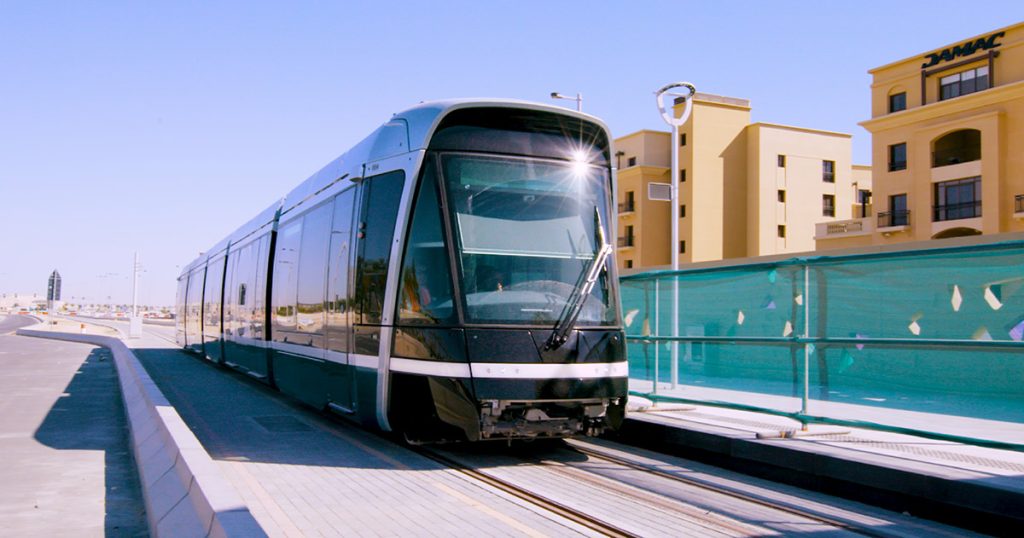
Doha Metro
The new Doha Metro will be responsible for transporting thousands of fans around the country. The electric metro system uses regenerative braking systems which help to reduce its carbon footprint. In addition, its stations carry various green credentials and operate under green building certification. The Metro forms the backbone of Qatar’s integrated public transport system and promoting its usage is a key ingredient of Qatar National Vision 2030. It is set to revolutionise the way people move around Doha and its suburbs during the tournament. Sustainable design, construction and operation has been incorporated throughout the metro network achieving industry leading GSAS Five-Star and LEED Gold awards. An LEED Certification is the most widely used global standard which recognises buildings that are efficient, cost-effective and better for occupants and the environment.
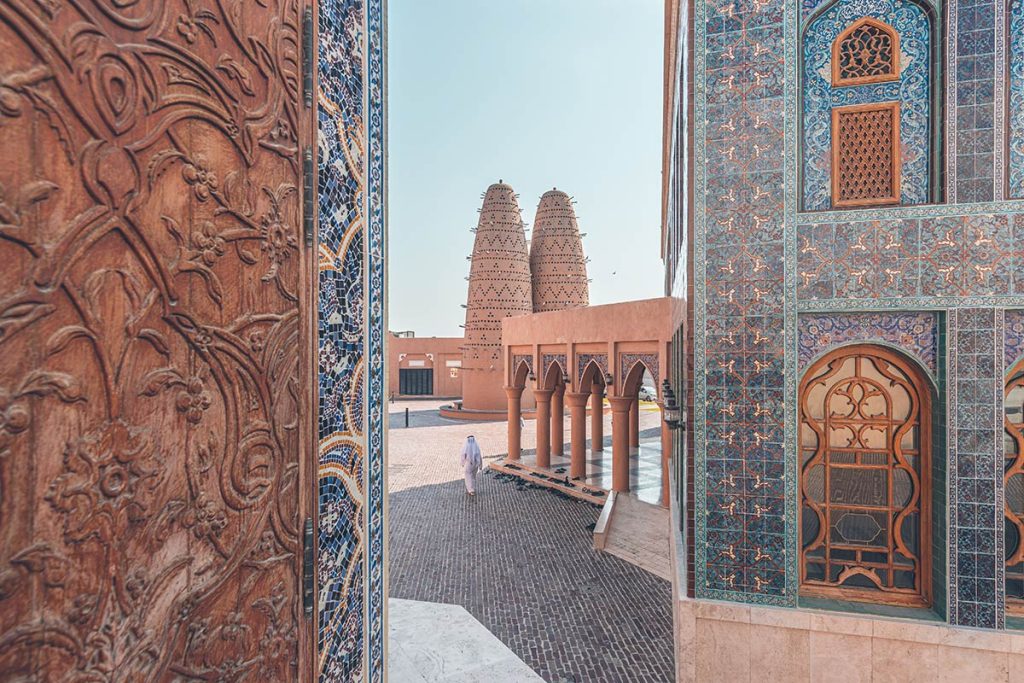
THE FUTURE IS GREEN
Planting Trees
Qatar has also pledged several planting initiatives coupled with a comprehensive climate action plan, which will help the country reach net-zero carbon emissions by 2050. Among these is the ‘Plant a Million Trees’ by the end of this year campaign and plans to plant 10 million trees by 2030. It’s hoped the initiative will tackle the issue of global warming. To keep global warming to no more than 1.5°C, global carbon emissions need to be reduced by 45% by 2030.
But it’s not just trees, in a step toward a greener future, authorities have been successful in almost doubling the number of mangroves along the country’s shores, taking 9km of green land to 14km in less than three years. Mangrove forests produce oxygen and absorb carbon dioxide and toxic gases, and this helps greatly in reducing global warming.
Electric Cars
Qatar is positioning itself to be a leader in the Gulf region for the adoption of electric vehicles. They play an important role in Qatar’s achievement of its National Vision 2030. As global demand and government support and subsidies increase for electric vehicles, Qatar is moving quickly to facilitate their adoption and reduce its carbon emissions. The Gulf state is diversifying its investments to transition to an eco-friendlier, more sustainable economy. Qatar’s electric vehicle strategy aims to install more than 600 charging stations to support electric buses ahead of the World Cup. While electric cars are not uncommon in Qatar right now, market share for electric cars is expected to increase as car chargers are installed throughout the country.
Eco-friendly PublicTransport
Qatar established an ambitious Electric Vehicle Strategy that was set in motion in September 2021. One of the goals outlined in the strategy was to transition 25% of Qatar’s public transit bus fleet from petrol to electric by 2022, which it has completed successfully, and reach 100% compliance by 2030. Several plans have also been put in motion to take a closer step towards greener initiatives, including progressively switching to electric on public buses and government school buses.
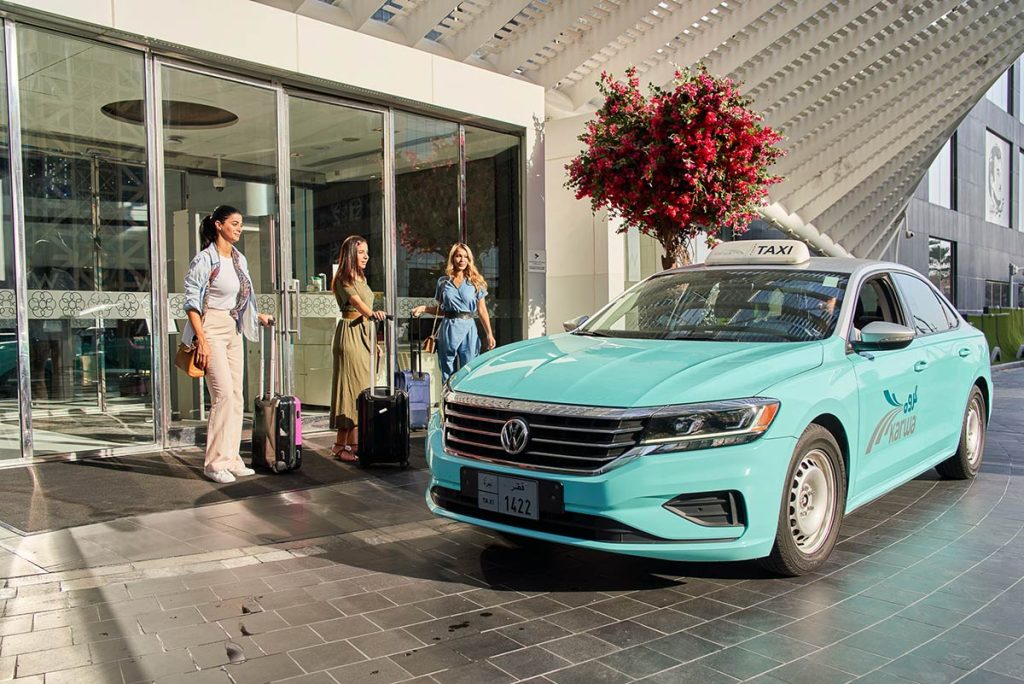
Greener Taxis
Mowasalat declared this year that all Karwa municipal taxis will be replaced with hybrid electric eco-vehicles in line with the country’s sustainability plan. The cars use a self-charging hybrid electric powertrain that combines an electric motor and a highly effective, low-emission fuel engine. In addition, a total of eight bus stations with electric charging stations will be entirely run by Mowasalat at Al Sudan, the Industrial Area, Al Wakra, the Education City, Lusail, Gharrafa and Msheireb. The West Bay Central Bus Station is set to open for business in November 2022.
Cleaner Energy
Qatar is a leading exporter of one of the cleanest fuels in the world, helping countries meet their energy needs while reducing carbon emissions from coal. Most recently QatarEnergy signed an agreement with US-based General Electric (GE) to develop a carbon capture roadmap for the Middle East nation’s energy sector. The Qatari state-owned company said it aims to “explore the feasibility of developing a world-scale carbon hub at Ras Laffan Industrial City which, as of today, is home to more than 80 GE gas turbines”.
QatarEnergy, which is spending more than USD50 billion for the expansion of its giant North Field, also aims to significantly reduce its carbon footprint across its oil and gas operations. The company’s most recent sustainability strategy outlines several initiatives to reduce greenhouse gas emissions.
Qatar Foundation
Co-founded and chaired by Her Royal Highness Sheikha Moza bint Nasser Al-Missned more than 25 years ago, Qatar Foundation is a non-profit organisation focusing on research, community and development. It’s strategically orientated to help Qatar reach its maximum potential and one of the key areas it focuses on is sustainability. The organisation also has a non-profit research and policy centre Earthna which works on informing and influencing national and global sustainable policy by researching and testing within the confines of Education City focussing also on environmental issues and climate change. Some of its initiatives include working on ensuring sustainability is a core component of children’s education, that will teach them to love and understand their environment and appreciate their ecosystem.
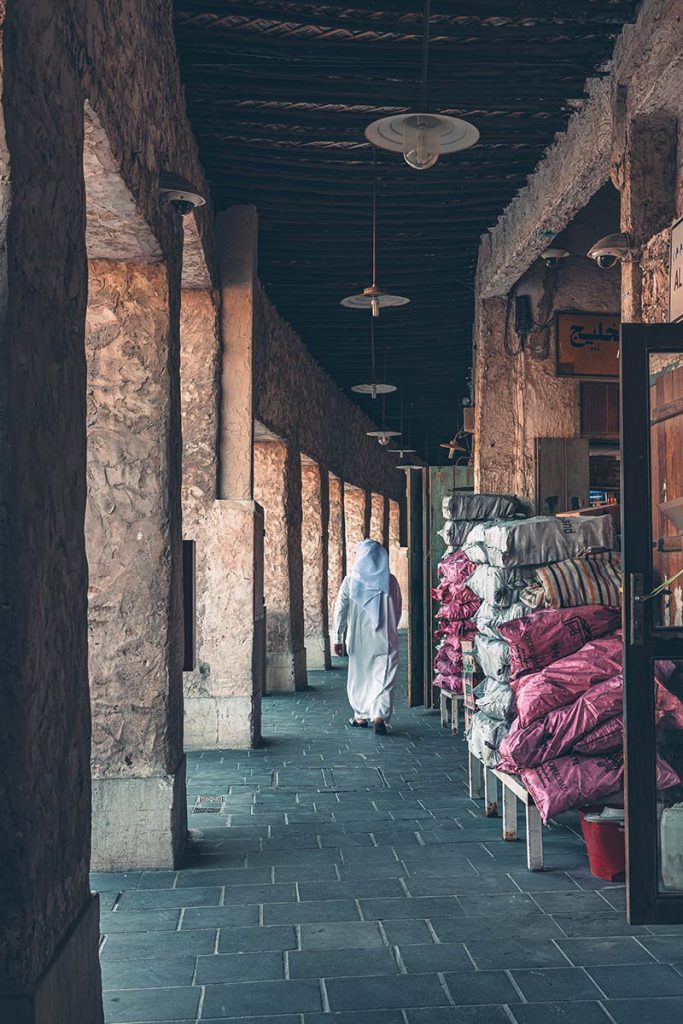
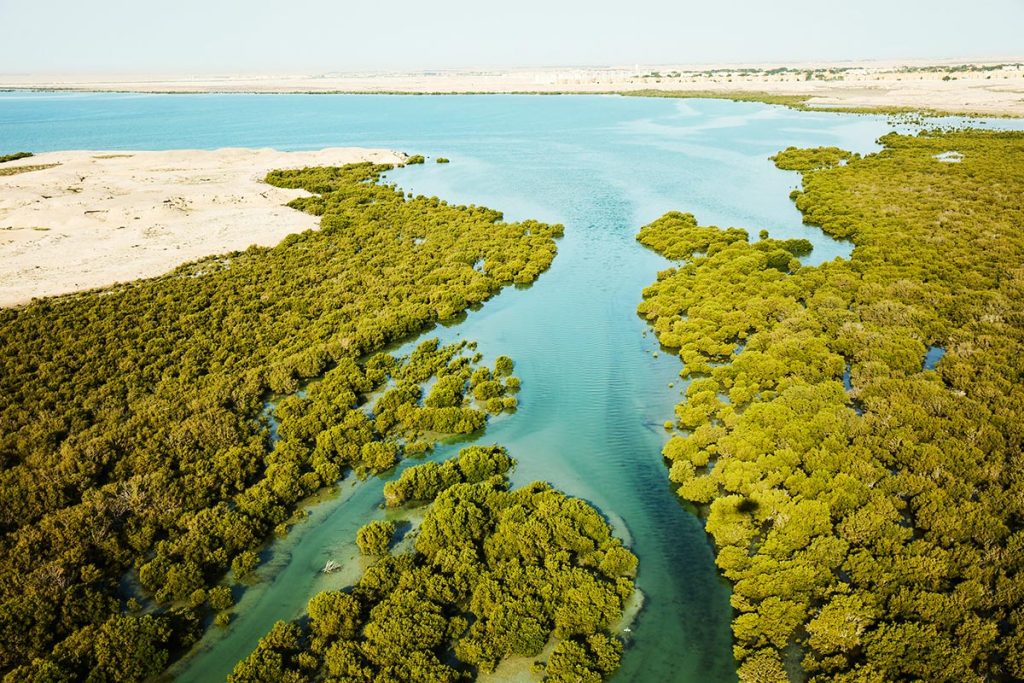
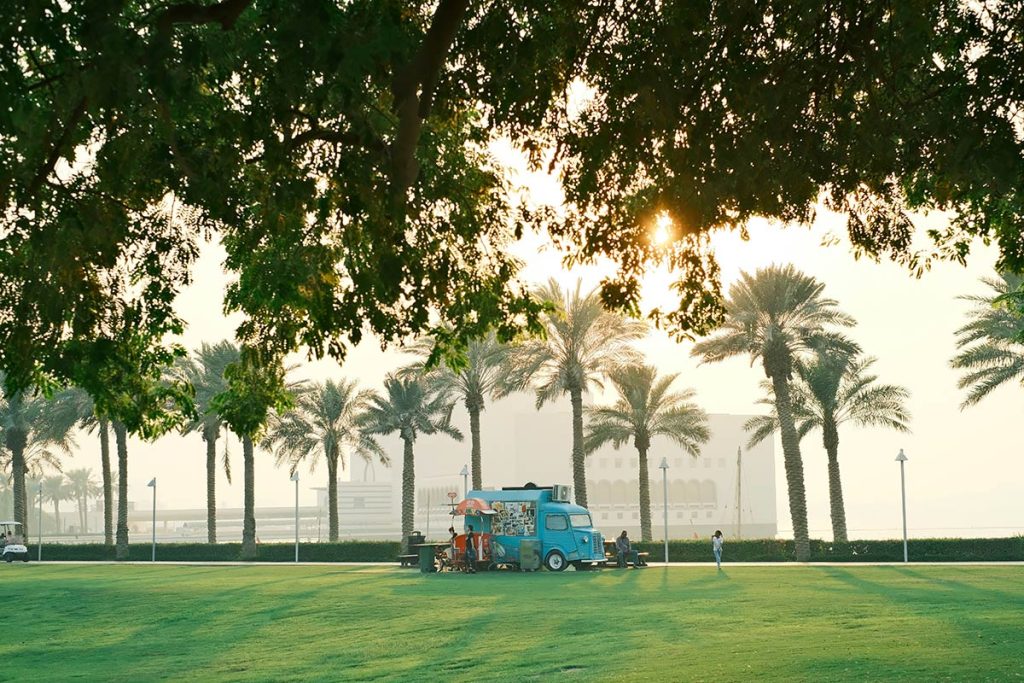
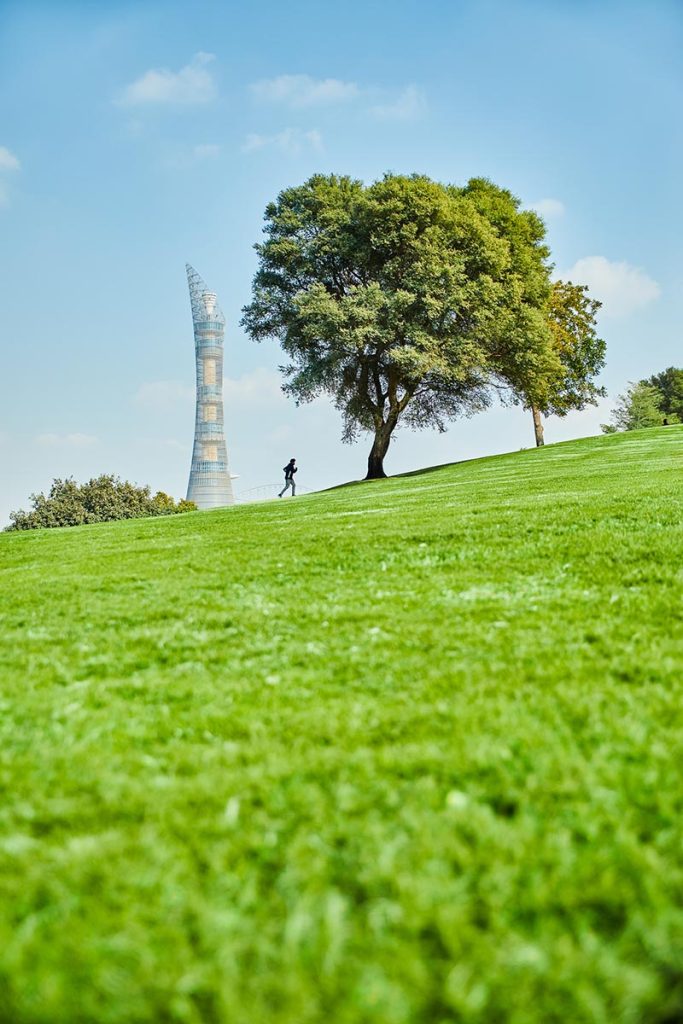
Green Infrastructure
Qatar has more than 1,400 buildings under the Global Sustainability Assessment System (GSAS), which highlights ‘green’ infrastructure across the country. GSAS is the first performance-based system in the Middle East and North Africa region that is developed to assess and rate buildings and infrastructure for their sustainability impact. It works on guiding projects on reducing their environmental footprint during design, construction, and operations stages. The innovative buildings are designed to cut electricity and water consumption while also reducing waste. This allows major infrastructure efforts to take place while also ensuring the environment is prioritised. An example is the recently completed Msheireb Downtown Doha regeneration project. It’s said to be the world’s first smart and sustainable regeneration project, the development has a high concentration of sustainable buildings accredited by the international green building certification system LEED, as well as 6,400 solar panels that generate four per cent of its energy.
Eco Schools
In 2018 Qatar Green Building Council became the national operator for Eco-Schools Qatar. Eco-Schools is the largest global sustainable schools programme created by the Foundation for Environmental Education (FEE). It starts in the classroom and expands to the community by engaging the next generation in action-based learning. The Eco-Schools programme is a two-year commitment course. It encourages young people to engage in their environment by allowing them the opportunity to actively protect it. Through the programme, young people experience a sense of achievement at being able to have a say in the environmental management policies of their schools, steering them towards certification and the prestige which comes with being awarded a Green Flag.

Eco Tourism
Last year, Qatar Tourism launched the country’s largest ever international tourism marketing campaign ‘Experience a World Beyond’ in a push to become the fastest-growing tourism destination in the Middle East. A new, dedicated website and mobile app was launched to showcase the world-leading destination as the launch of more than 100 new hotels approaches in time for the FIFA World Cup Qatar 2022. Since the launch, Qatar tourism scene has grown tremendously. However, a part of the country’s tourism drive also includes its natural environments ranging from wetlands to natural areas, flora, fauna and other habitats. Qatar has also taken advantage of the whale shark gathering, ensuring locals, residents and tourists can enjoy this natural phenomenon in a secured and controlled area, posing no harm or disruption to this habitat.
In 2014, the Qatar Tourism Authority developed the Qatar National Tourism Sector Strategy 2030 that designs the pathway through which the country will achieve sustainable development for the tourism sector by 2030.
Reducing The Carbon Footprint
Most recently Qatar held a national dialogue Climate Change and Sustainable Development, where the Minister of Environment and Climate Change, Sheikh Dr Faleh bin Nasser bin Ahmad bin Ali Al Thani, emphasised the importance that Qatar places on tackling climate change saying: “Protecting the environment and supporting sustainable development has always been a top priority for Qatar.
“As one of the first countries to ratify the United Nations Framework Convention on Climate Change in 1996, Qatar has demonstrated a long-standing commitment to addressing global environmental challenges.”

Use. Recycle. Repeat.
Qatar’s latest waste management centre is going to recycle 20,000 tonnes of waste and treat it to generate electricity. Authorities hope the project will take the country closer to accomplishing its strategic goals of building ‘a circular economy and helping protect the environment for future generations to come’.
In an attempt to deliver a sustainable FIFA World Cup Qatar 2022, authorities are planning to operate three mobile waste transfer stations by the end of this year. The stations aim to collect waste while facilitating the transfer process with the help of greener, cutting-edge technology.
Earlier this year, Qatar Foundation announced plans to build the Gulf nation’s first-ever recycling hub to encourage sustainability within the community. The project is set to cover more than 8,000sq/m in Education City and will feature six recycling streams, including paper, plastic, aluminium cans, e-waste, batteries and organic waste.
As well as these national commitments, Qatar’s state-owned national carrier Qatar Airways has also reiterated its commitment to environmental sustainability and investment on sustainable aviation fuel (SAF).
While there is still plenty of work to be done in achieving Qatar’s National Vision within the next eight years, the Gulf nation continues to fly high in making sustainability and protecting the environment a top priority for the country. ✤


